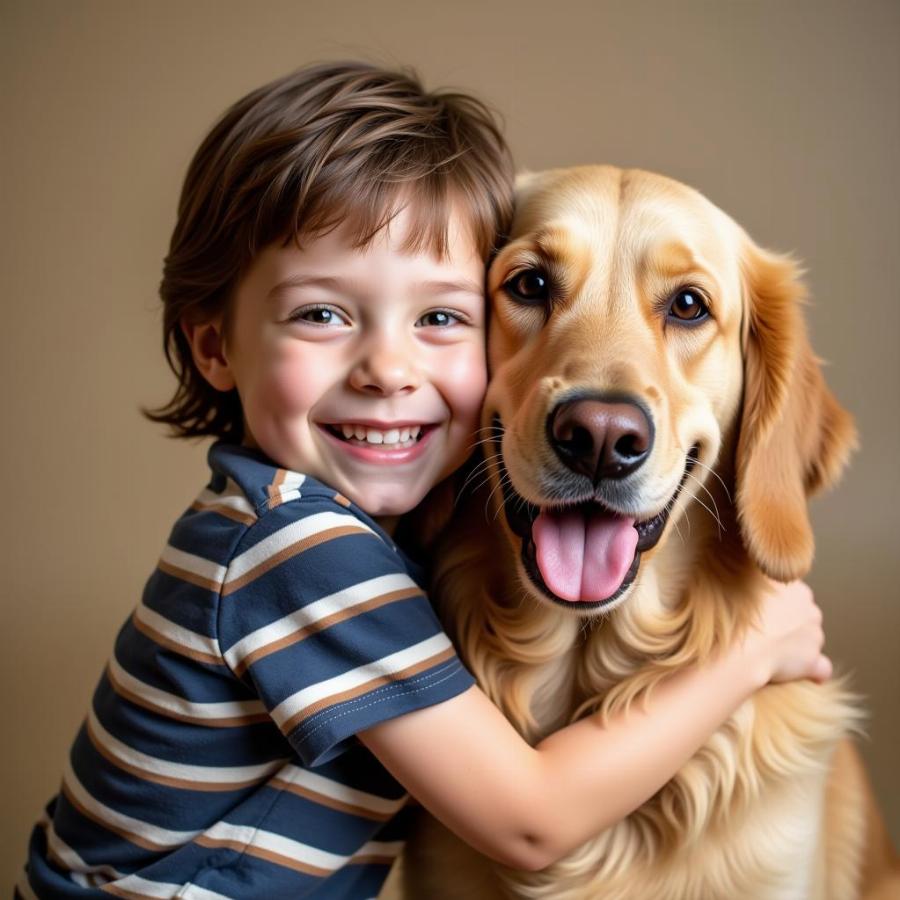Navigating the world with an autistic child often presents unique challenges, but the companionship of a well-trained dog can be immensely beneficial. As you research the best ways to support your child, you might be wondering about an “fi dog collar for autistic child.” While the term “fi dog collar” isn’t directly related to autism support, it likely refers to smart collars like the Fi GPS tracker. This leads us to a crucial question: how can technology and canine companionship intersect to enhance the life of an autistic child?
The Power of Dogs for Autistic Children
Dogs can offer incredible emotional support and companionship for autistic children. Their unconditional love, predictable routines, and calming presence can significantly reduce anxiety and sensory overload.
 Autistic Child Embracing a Dog
Autistic Child Embracing a Dog
Here’s how dogs can positively impact autistic children:
- Emotional Regulation: Dogs provide a source of comfort and security, helping children regulate their emotions during meltdowns or periods of high anxiety.
- Social Interaction: Dogs can act as social bridges, encouraging interaction and communication. Their presence can make social situations feel less overwhelming.
- Sensory Input: The act of petting a dog offers calming tactile stimulation, which can be grounding for children with sensory sensitivities.
- Routine and Responsibility: Caring for a dog instills a sense of responsibility and routine, which can be beneficial for children who thrive on predictability.
Choosing the Right Dog for an Autistic Child
Selecting the appropriate dog breed is paramount when considering a canine companion for an autistic child. Certain breeds are known for their gentle nature, patience, and intuition, making them well-suited for this role.
Breeds to Consider:
- Golden Retriever: Renowned for their gentle disposition and eagerness to please, Golden Retrievers are often considered ideal therapy dogs.
- Labrador Retriever: Similar to Golden Retrievers, Labradors are intelligent, patient, and form strong bonds with their families.
- Newfoundland: These gentle giants are known for their calm demeanor and natural affinity for children.
- Poodle: Highly intelligent and hypoallergenic, Poodles can be trained to assist with various tasks and provide emotional support.
Factors to Consider:
- Temperament: Choose a dog with a calm, patient, and tolerant temperament.
- Energy Level: Match the dog’s energy level with your child’s activity preferences. A high-energy dog might be overwhelming.
- Size: Consider the dog’s size in relation to your child’s age and physical abilities.
- Grooming Needs: Opt for a breed with manageable grooming needs to avoid additional sensory challenges.
Training Your Dog for Autism Support
While some dogs possess an innate ability to provide comfort, formal training is essential to ensure they can effectively support an autistic child.
- Professional Training: Seek out a certified dog trainer experienced in working with autistic children. They can tailor training to your child’s specific needs.
- Basic Obedience: Ensure your dog masters basic commands like “sit,” “stay,” “come,” and “leave it.”
- Deep Pressure Therapy: Train your dog to provide deep pressure therapy by lying gently on your child’s lap or feet, which can have a calming effect.
- Sensory Overload Response: Teach your dog to recognize signs of sensory overload in your child and respond with soothing behaviors like licking or nuzzling.
The Role of Technology: Exploring Smart Collars
While not directly related to autism support, smart collars like the Fi GPS tracker can offer valuable features that enhance the safety and well-being of any dog, including those partnered with autistic children.
Fi Collar Features:
- GPS Tracking: Provides real-time location tracking, offering peace of mind in case your dog wanders off, especially important if your child is prone to elopement.
- Activity Monitoring: Tracks your dog’s activity levels, helping you ensure they’re getting enough exercise and identifying potential health concerns.
- Safe Zones: Allows you to set up virtual fences and receive notifications if your dog leaves a designated safe area.
It’s important to note that while technology can be helpful, it shouldn’t replace proper supervision and training.
Conclusion
Integrating a dog into the life of an autistic child can be a deeply rewarding experience. While an “fi dog collar for autistic child” might not be a specific product, the technology of smart collars can complement the incredible support dogs offer. By carefully choosing the right breed, investing in professional training, and understanding how technology can play a role, you can create a loving and supportive environment where both your child and your furry companion can thrive.
FAQs
1. Are all dogs suitable for autistic children?
No, not all dogs are a good fit. It’s essential to choose a breed known for its gentle and patient nature.
2. Can any dog be trained for autism support?
While many dogs can provide companionship, formal training from a professional experienced in autism support is crucial.
3. How can I find a reputable dog trainer for autism support?
Consult with your child’s therapist or organizations specializing in autism support for recommendations.
4. What should I do if my child is afraid of dogs?
Introduce dogs gradually and in controlled environments. Seek professional guidance if needed.
5. Can a dog replace professional therapy for my child?
No, dogs provide companionship and support but are not a replacement for professional therapy or interventions.
Looking for More Information on Dogs and Family Life?
Explore these other helpful articles on Beaut Dogs:
- Choosing the Right Dog Breed for Families
- Dog Training Tips for a Harmonious Home
- Understanding Canine Body Language
Beaut Dogs: Your Trusted Source for Canine Information
Beaut Dogs is your comprehensive resource for everything related to dog ownership, offering expert advice on breeds, care, training, and more. We’re dedicated to providing dog lovers like you with the knowledge and support you need to build a loving and fulfilling relationship with your furry companion. For personalized assistance, reach out to our team at [email protected].